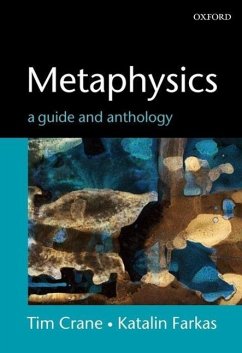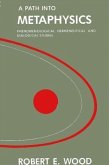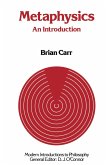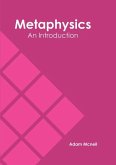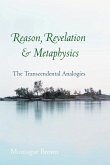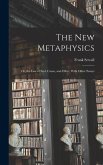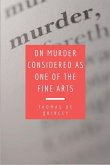- Broschiertes Buch
- Merkliste
- Auf die Merkliste
- Bewerten Bewerten
- Teilen
- Produkt teilen
- Produkterinnerung
- Produkterinnerung
This anthology provides an extensive and varied collection of the best classical and contemporary readings in metaphysics, as well as substantial editorial material, which set the extracts in context and guide the reader through them.
The book is divided into 10 sections, providing instructors with flexibility in designing and teaching a variety of courses. It contains 54 important writings on metaphysics, with introductions to each section, discussion questions and detailed guides to further reading. Perfect for undergraduate courses, this book offers the ideal self-contained introduction to metaphysics.…mehr
Andere Kunden interessierten sich auch für
![A Path Into Metaphysics: Phenomenological, Hermeneutical, and Dialogical Studies A Path Into Metaphysics: Phenomenological, Hermeneutical, and Dialogical Studies]() Robert E. WoodA Path Into Metaphysics: Phenomenological, Hermeneutical, and Dialogical Studies109,99 €
Robert E. WoodA Path Into Metaphysics: Phenomenological, Hermeneutical, and Dialogical Studies109,99 €![Metaphysics: An Introduction Metaphysics: An Introduction]() Brian CarrMetaphysics: An Introduction47,99 €
Brian CarrMetaphysics: An Introduction47,99 €![Metaphysics: An Introduction Metaphysics: An Introduction]() Metaphysics: An Introduction159,99 €
Metaphysics: An Introduction159,99 €![Reason, Revelation, and Metaphysics: The Transcendental Analogies Reason, Revelation, and Metaphysics: The Transcendental Analogies]() Montague BrownReason, Revelation, and Metaphysics: The Transcendental Analogies84,99 €
Montague BrownReason, Revelation, and Metaphysics: The Transcendental Analogies84,99 €![An Anthology of Essays by Ashraf An Anthology of Essays by Ashraf]() Mirza Iqbal AshrafAn Anthology of Essays by Ashraf40,99 €
Mirza Iqbal AshrafAn Anthology of Essays by Ashraf40,99 €![The New Metaphysics: Or, the Law of End, Cause, and Effect, With Other Essays The New Metaphysics: Or, the Law of End, Cause, and Effect, With Other Essays]() Frank SewallThe New Metaphysics: Or, the Law of End, Cause, and Effect, With Other Essays36,99 €
Frank SewallThe New Metaphysics: Or, the Law of End, Cause, and Effect, With Other Essays36,99 €![On Murder Considered as one of the Fine Arts On Murder Considered as one of the Fine Arts]() Thomas De QuinceyOn Murder Considered as one of the Fine Arts15,99 €
Thomas De QuinceyOn Murder Considered as one of the Fine Arts15,99 €-
-
-
This anthology provides an extensive and varied collection of the best classical and contemporary readings in metaphysics, as well as substantial editorial material, which set the extracts in context and guide the reader through them.
The book is divided into 10 sections, providing instructors with flexibility in designing and teaching a variety of courses. It contains 54 important writings on metaphysics, with introductions to each section, discussion questions and detailed guides to further reading. Perfect for undergraduate courses, this book offers the ideal self-contained introduction to metaphysics.
Hinweis: Dieser Artikel kann nur an eine deutsche Lieferadresse ausgeliefert werden.
The book is divided into 10 sections, providing instructors with flexibility in designing and teaching a variety of courses. It contains 54 important writings on metaphysics, with introductions to each section, discussion questions and detailed guides to further reading. Perfect for undergraduate courses, this book offers the ideal self-contained introduction to metaphysics.
Hinweis: Dieser Artikel kann nur an eine deutsche Lieferadresse ausgeliefert werden.
Produktdetails
- Produktdetails
- Verlag: Oxford University Press
- Seitenzahl: 792
- Erscheinungstermin: 15. Januar 2004
- Englisch
- Abmessung: 249mm x 172mm x 45mm
- Gewicht: 1375g
- ISBN-13: 9780199261970
- ISBN-10: 0199261970
- Artikelnr.: 14981845
- Herstellerkennzeichnung
- Libri GmbH
- Europaallee 1
- 36244 Bad Hersfeld
- 06621 890
- Verlag: Oxford University Press
- Seitenzahl: 792
- Erscheinungstermin: 15. Januar 2004
- Englisch
- Abmessung: 249mm x 172mm x 45mm
- Gewicht: 1375g
- ISBN-13: 9780199261970
- ISBN-10: 0199261970
- Artikelnr.: 14981845
- Herstellerkennzeichnung
- Libri GmbH
- Europaallee 1
- 36244 Bad Hersfeld
- 06621 890
Tim Crane has taught philosophy at University College London since 1990. He took his PhD at the University of Cambridge in 1989. Katalin Farkas graduated in mathematics and philosophy from the Eötvös Loránd University, Budapest, and she took her PhD in philosophy from the Hungarian Academy of Sciences in 1998.
* I God
*
* 1: Derek Parfit: Why Anything? Why This?
* 2: Thomas Aquinas: The five ways
* 3: William Paley: Extract from Natural Theology
* 4: Anselm of Canterbury: Extract from Proslogion
* 5: G.W. Leibniz: Extract from Monadology
* 6: J.L. Mackie: Evil and omnipotence
* II Realism and Idealism
* Introduction
* 7: John Locke: Selection from Essay Concerning Human Understanding
* 8: George Berkeley: Selection from Three Dialogues
* 9: Immanuel Kant: Selection from Critique of Pure Reason
* 10: Selection from Matter and Sense
* 11: Michael Dummett: Realism
* III Being
* Introduction
* 12: Aristotle: Selection from Categories
* 13: John Locke: Selection from Essay Concerning Human Understanding
* 14: Robert Merrihew Adams: Primitive Thisness and Primitive Identity
* 15: W.V. Quine: On what there is
* 16: Peter van Inwagen: Selection from Material Beings
* 17: Gareth Evans: Can there be vague objects?
* 18: David Lewis: Vague Identity: Evans misunderstood
* Part IV Universals and Particulars
* Introduction
* 19: Plato: Selections from Republic and Parmenides
* 20: D.M. Armstrong: Selection from Universals: An Opinionated
Introduction
* 21: David Lewis: Selection from New work for a theory of universals
* 22: Donald C. Williams: On the Elements of Being: I
* 23: Sydney Shoemaker: Causality and Properties
* Part V Necessity
* Introduction
* 24: Saul Kripke: Selection from Naming and Necessity
* 25: David Lewis: Selection from On the Plurality of Worlds
* 26: Alvin Plantinga: Actualism and Possible Worlds
* 27: D.M. Armstrong: Selection from A Combinational Theory of
Possibility
* Part VI Causation
* Introduction
* 28: Aristotle: Selection from Metaphysics
* 29: David Hume: Selection from Enquiy Concerning Human Understanding
* 30: David Lewis: Causation
* 31: Donald Davidson: Causal Relations
* 32: D.H. Mellor: Selections from The Faces of Causation
* VII Time and Space
* Introduction
* 33: Aristotle: Selection from Physics
* 34: J.M.E McTaggart: Selection from The Nature of Existence
* 35: Arthur N. Prior: Changes in Events and Changes in Things
* 36: Paul Horwich: Selection from Asymmetries in Time
* 37: Selection from The Leibniz-Clarke Correspondence
* 38: J.J.C. Smart: The space-time world
* 39: David Lewis: The Paradoxes of Time Travel
* Part VIII Identity
* Introduction
* 40: Roderick M. Chisholm: Identity through Time
* 41: David Lewis: Selection from On the Plurality of Worlds
* 42: Derek Parfit: Personal Identity
* 43: P.F. Snowdon: Persons, Animals, and Ourselves
* Part IX Mind and Body
* Introduction
* 44: Rene Descartes: Selection from Meditations on First Philosophy
* 45: G.W. Leibniz: Selection from New System of the Nature of
Substances
* 46: Gilbert Harman: Selections from Thought
* 47: David Lewis: Psychophysical and theoretical identifications
* 48: Donald Davidson: Selection from Thinking Causes
* 49: Thomas Nagel: What is it like to be a bat?
* X Freedom and Determinism
* Introduction
* 50: David Hume: Selection from Treatise of Human Nature
* 51: Harry Frankfurt: Freedom of the will and the concept of a person
* 52: Peter van Inwagen: The incompatibility of freewill and
determinism
* 53: Barry Loewer: Freedom from Physics: Quantum Mechanics and Free
Will
* 54: Roderick M. Chisholm: Human Freedom and the self
*
* 1: Derek Parfit: Why Anything? Why This?
* 2: Thomas Aquinas: The five ways
* 3: William Paley: Extract from Natural Theology
* 4: Anselm of Canterbury: Extract from Proslogion
* 5: G.W. Leibniz: Extract from Monadology
* 6: J.L. Mackie: Evil and omnipotence
* II Realism and Idealism
* Introduction
* 7: John Locke: Selection from Essay Concerning Human Understanding
* 8: George Berkeley: Selection from Three Dialogues
* 9: Immanuel Kant: Selection from Critique of Pure Reason
* 10: Selection from Matter and Sense
* 11: Michael Dummett: Realism
* III Being
* Introduction
* 12: Aristotle: Selection from Categories
* 13: John Locke: Selection from Essay Concerning Human Understanding
* 14: Robert Merrihew Adams: Primitive Thisness and Primitive Identity
* 15: W.V. Quine: On what there is
* 16: Peter van Inwagen: Selection from Material Beings
* 17: Gareth Evans: Can there be vague objects?
* 18: David Lewis: Vague Identity: Evans misunderstood
* Part IV Universals and Particulars
* Introduction
* 19: Plato: Selections from Republic and Parmenides
* 20: D.M. Armstrong: Selection from Universals: An Opinionated
Introduction
* 21: David Lewis: Selection from New work for a theory of universals
* 22: Donald C. Williams: On the Elements of Being: I
* 23: Sydney Shoemaker: Causality and Properties
* Part V Necessity
* Introduction
* 24: Saul Kripke: Selection from Naming and Necessity
* 25: David Lewis: Selection from On the Plurality of Worlds
* 26: Alvin Plantinga: Actualism and Possible Worlds
* 27: D.M. Armstrong: Selection from A Combinational Theory of
Possibility
* Part VI Causation
* Introduction
* 28: Aristotle: Selection from Metaphysics
* 29: David Hume: Selection from Enquiy Concerning Human Understanding
* 30: David Lewis: Causation
* 31: Donald Davidson: Causal Relations
* 32: D.H. Mellor: Selections from The Faces of Causation
* VII Time and Space
* Introduction
* 33: Aristotle: Selection from Physics
* 34: J.M.E McTaggart: Selection from The Nature of Existence
* 35: Arthur N. Prior: Changes in Events and Changes in Things
* 36: Paul Horwich: Selection from Asymmetries in Time
* 37: Selection from The Leibniz-Clarke Correspondence
* 38: J.J.C. Smart: The space-time world
* 39: David Lewis: The Paradoxes of Time Travel
* Part VIII Identity
* Introduction
* 40: Roderick M. Chisholm: Identity through Time
* 41: David Lewis: Selection from On the Plurality of Worlds
* 42: Derek Parfit: Personal Identity
* 43: P.F. Snowdon: Persons, Animals, and Ourselves
* Part IX Mind and Body
* Introduction
* 44: Rene Descartes: Selection from Meditations on First Philosophy
* 45: G.W. Leibniz: Selection from New System of the Nature of
Substances
* 46: Gilbert Harman: Selections from Thought
* 47: David Lewis: Psychophysical and theoretical identifications
* 48: Donald Davidson: Selection from Thinking Causes
* 49: Thomas Nagel: What is it like to be a bat?
* X Freedom and Determinism
* Introduction
* 50: David Hume: Selection from Treatise of Human Nature
* 51: Harry Frankfurt: Freedom of the will and the concept of a person
* 52: Peter van Inwagen: The incompatibility of freewill and
determinism
* 53: Barry Loewer: Freedom from Physics: Quantum Mechanics and Free
Will
* 54: Roderick M. Chisholm: Human Freedom and the self
* I God
*
* 1: Derek Parfit: Why Anything? Why This?
* 2: Thomas Aquinas: The five ways
* 3: William Paley: Extract from Natural Theology
* 4: Anselm of Canterbury: Extract from Proslogion
* 5: G.W. Leibniz: Extract from Monadology
* 6: J.L. Mackie: Evil and omnipotence
* II Realism and Idealism
* Introduction
* 7: John Locke: Selection from Essay Concerning Human Understanding
* 8: George Berkeley: Selection from Three Dialogues
* 9: Immanuel Kant: Selection from Critique of Pure Reason
* 10: Selection from Matter and Sense
* 11: Michael Dummett: Realism
* III Being
* Introduction
* 12: Aristotle: Selection from Categories
* 13: John Locke: Selection from Essay Concerning Human Understanding
* 14: Robert Merrihew Adams: Primitive Thisness and Primitive Identity
* 15: W.V. Quine: On what there is
* 16: Peter van Inwagen: Selection from Material Beings
* 17: Gareth Evans: Can there be vague objects?
* 18: David Lewis: Vague Identity: Evans misunderstood
* Part IV Universals and Particulars
* Introduction
* 19: Plato: Selections from Republic and Parmenides
* 20: D.M. Armstrong: Selection from Universals: An Opinionated
Introduction
* 21: David Lewis: Selection from New work for a theory of universals
* 22: Donald C. Williams: On the Elements of Being: I
* 23: Sydney Shoemaker: Causality and Properties
* Part V Necessity
* Introduction
* 24: Saul Kripke: Selection from Naming and Necessity
* 25: David Lewis: Selection from On the Plurality of Worlds
* 26: Alvin Plantinga: Actualism and Possible Worlds
* 27: D.M. Armstrong: Selection from A Combinational Theory of
Possibility
* Part VI Causation
* Introduction
* 28: Aristotle: Selection from Metaphysics
* 29: David Hume: Selection from Enquiy Concerning Human Understanding
* 30: David Lewis: Causation
* 31: Donald Davidson: Causal Relations
* 32: D.H. Mellor: Selections from The Faces of Causation
* VII Time and Space
* Introduction
* 33: Aristotle: Selection from Physics
* 34: J.M.E McTaggart: Selection from The Nature of Existence
* 35: Arthur N. Prior: Changes in Events and Changes in Things
* 36: Paul Horwich: Selection from Asymmetries in Time
* 37: Selection from The Leibniz-Clarke Correspondence
* 38: J.J.C. Smart: The space-time world
* 39: David Lewis: The Paradoxes of Time Travel
* Part VIII Identity
* Introduction
* 40: Roderick M. Chisholm: Identity through Time
* 41: David Lewis: Selection from On the Plurality of Worlds
* 42: Derek Parfit: Personal Identity
* 43: P.F. Snowdon: Persons, Animals, and Ourselves
* Part IX Mind and Body
* Introduction
* 44: Rene Descartes: Selection from Meditations on First Philosophy
* 45: G.W. Leibniz: Selection from New System of the Nature of
Substances
* 46: Gilbert Harman: Selections from Thought
* 47: David Lewis: Psychophysical and theoretical identifications
* 48: Donald Davidson: Selection from Thinking Causes
* 49: Thomas Nagel: What is it like to be a bat?
* X Freedom and Determinism
* Introduction
* 50: David Hume: Selection from Treatise of Human Nature
* 51: Harry Frankfurt: Freedom of the will and the concept of a person
* 52: Peter van Inwagen: The incompatibility of freewill and
determinism
* 53: Barry Loewer: Freedom from Physics: Quantum Mechanics and Free
Will
* 54: Roderick M. Chisholm: Human Freedom and the self
*
* 1: Derek Parfit: Why Anything? Why This?
* 2: Thomas Aquinas: The five ways
* 3: William Paley: Extract from Natural Theology
* 4: Anselm of Canterbury: Extract from Proslogion
* 5: G.W. Leibniz: Extract from Monadology
* 6: J.L. Mackie: Evil and omnipotence
* II Realism and Idealism
* Introduction
* 7: John Locke: Selection from Essay Concerning Human Understanding
* 8: George Berkeley: Selection from Three Dialogues
* 9: Immanuel Kant: Selection from Critique of Pure Reason
* 10: Selection from Matter and Sense
* 11: Michael Dummett: Realism
* III Being
* Introduction
* 12: Aristotle: Selection from Categories
* 13: John Locke: Selection from Essay Concerning Human Understanding
* 14: Robert Merrihew Adams: Primitive Thisness and Primitive Identity
* 15: W.V. Quine: On what there is
* 16: Peter van Inwagen: Selection from Material Beings
* 17: Gareth Evans: Can there be vague objects?
* 18: David Lewis: Vague Identity: Evans misunderstood
* Part IV Universals and Particulars
* Introduction
* 19: Plato: Selections from Republic and Parmenides
* 20: D.M. Armstrong: Selection from Universals: An Opinionated
Introduction
* 21: David Lewis: Selection from New work for a theory of universals
* 22: Donald C. Williams: On the Elements of Being: I
* 23: Sydney Shoemaker: Causality and Properties
* Part V Necessity
* Introduction
* 24: Saul Kripke: Selection from Naming and Necessity
* 25: David Lewis: Selection from On the Plurality of Worlds
* 26: Alvin Plantinga: Actualism and Possible Worlds
* 27: D.M. Armstrong: Selection from A Combinational Theory of
Possibility
* Part VI Causation
* Introduction
* 28: Aristotle: Selection from Metaphysics
* 29: David Hume: Selection from Enquiy Concerning Human Understanding
* 30: David Lewis: Causation
* 31: Donald Davidson: Causal Relations
* 32: D.H. Mellor: Selections from The Faces of Causation
* VII Time and Space
* Introduction
* 33: Aristotle: Selection from Physics
* 34: J.M.E McTaggart: Selection from The Nature of Existence
* 35: Arthur N. Prior: Changes in Events and Changes in Things
* 36: Paul Horwich: Selection from Asymmetries in Time
* 37: Selection from The Leibniz-Clarke Correspondence
* 38: J.J.C. Smart: The space-time world
* 39: David Lewis: The Paradoxes of Time Travel
* Part VIII Identity
* Introduction
* 40: Roderick M. Chisholm: Identity through Time
* 41: David Lewis: Selection from On the Plurality of Worlds
* 42: Derek Parfit: Personal Identity
* 43: P.F. Snowdon: Persons, Animals, and Ourselves
* Part IX Mind and Body
* Introduction
* 44: Rene Descartes: Selection from Meditations on First Philosophy
* 45: G.W. Leibniz: Selection from New System of the Nature of
Substances
* 46: Gilbert Harman: Selections from Thought
* 47: David Lewis: Psychophysical and theoretical identifications
* 48: Donald Davidson: Selection from Thinking Causes
* 49: Thomas Nagel: What is it like to be a bat?
* X Freedom and Determinism
* Introduction
* 50: David Hume: Selection from Treatise of Human Nature
* 51: Harry Frankfurt: Freedom of the will and the concept of a person
* 52: Peter van Inwagen: The incompatibility of freewill and
determinism
* 53: Barry Loewer: Freedom from Physics: Quantum Mechanics and Free
Will
* 54: Roderick M. Chisholm: Human Freedom and the self

